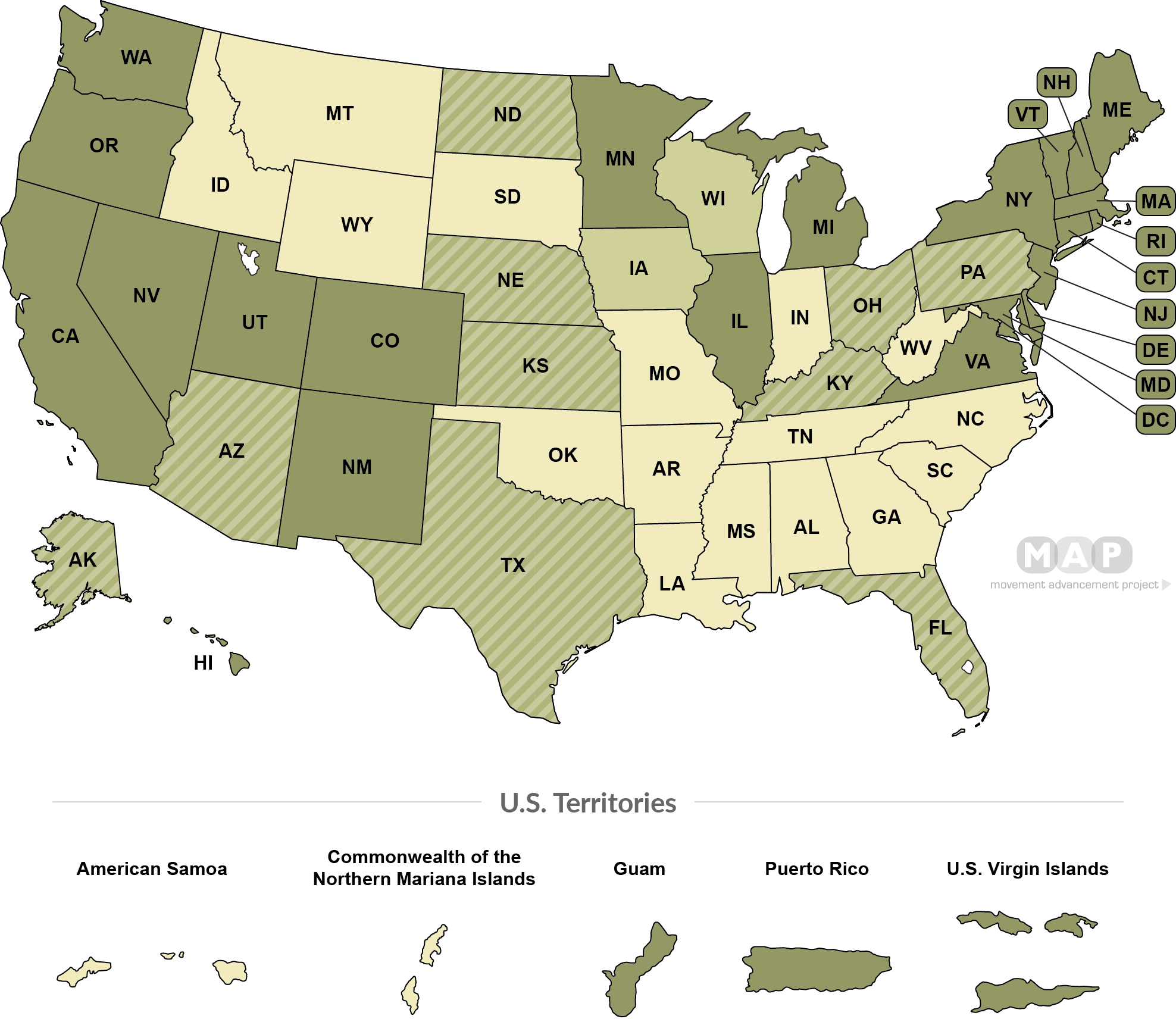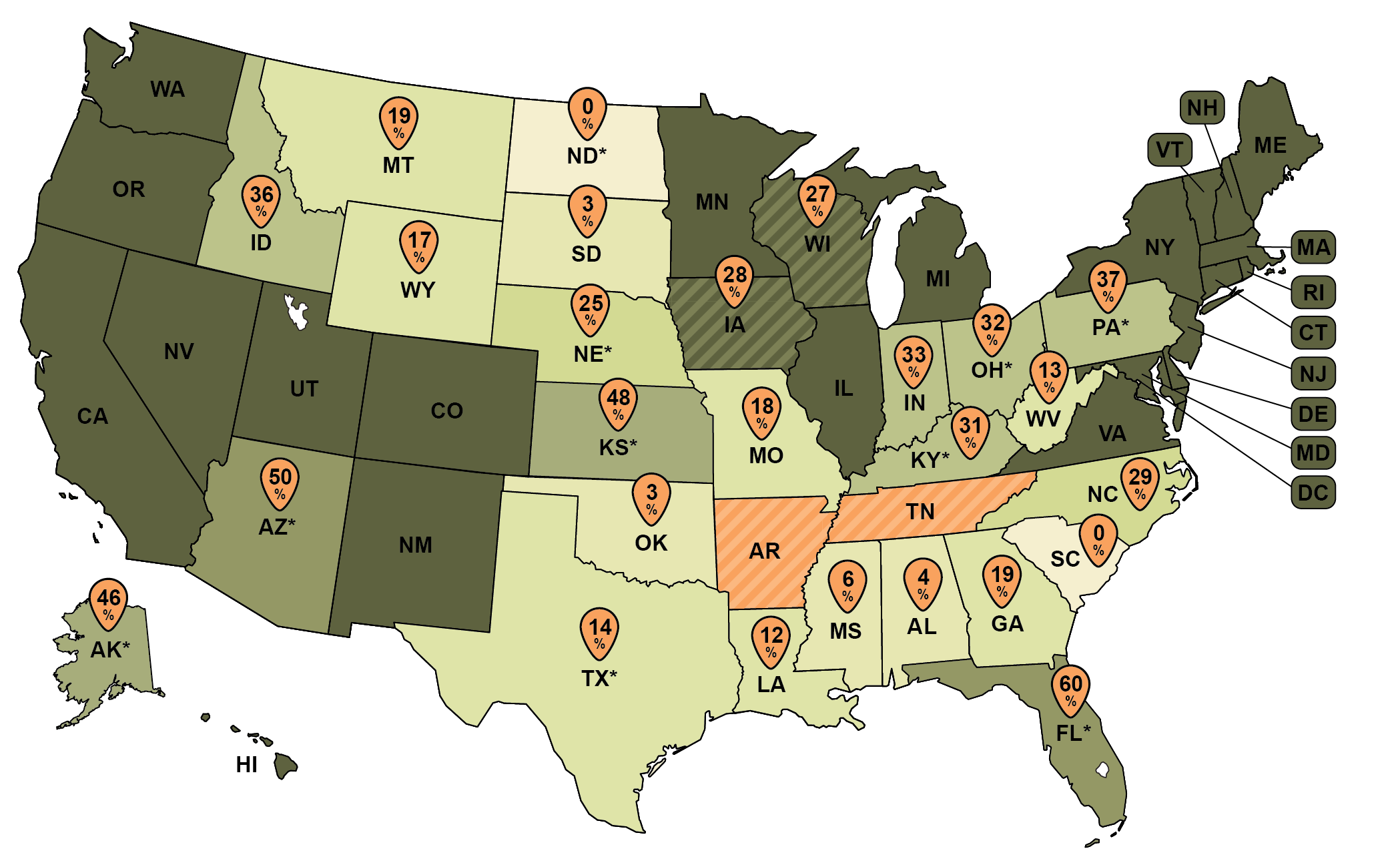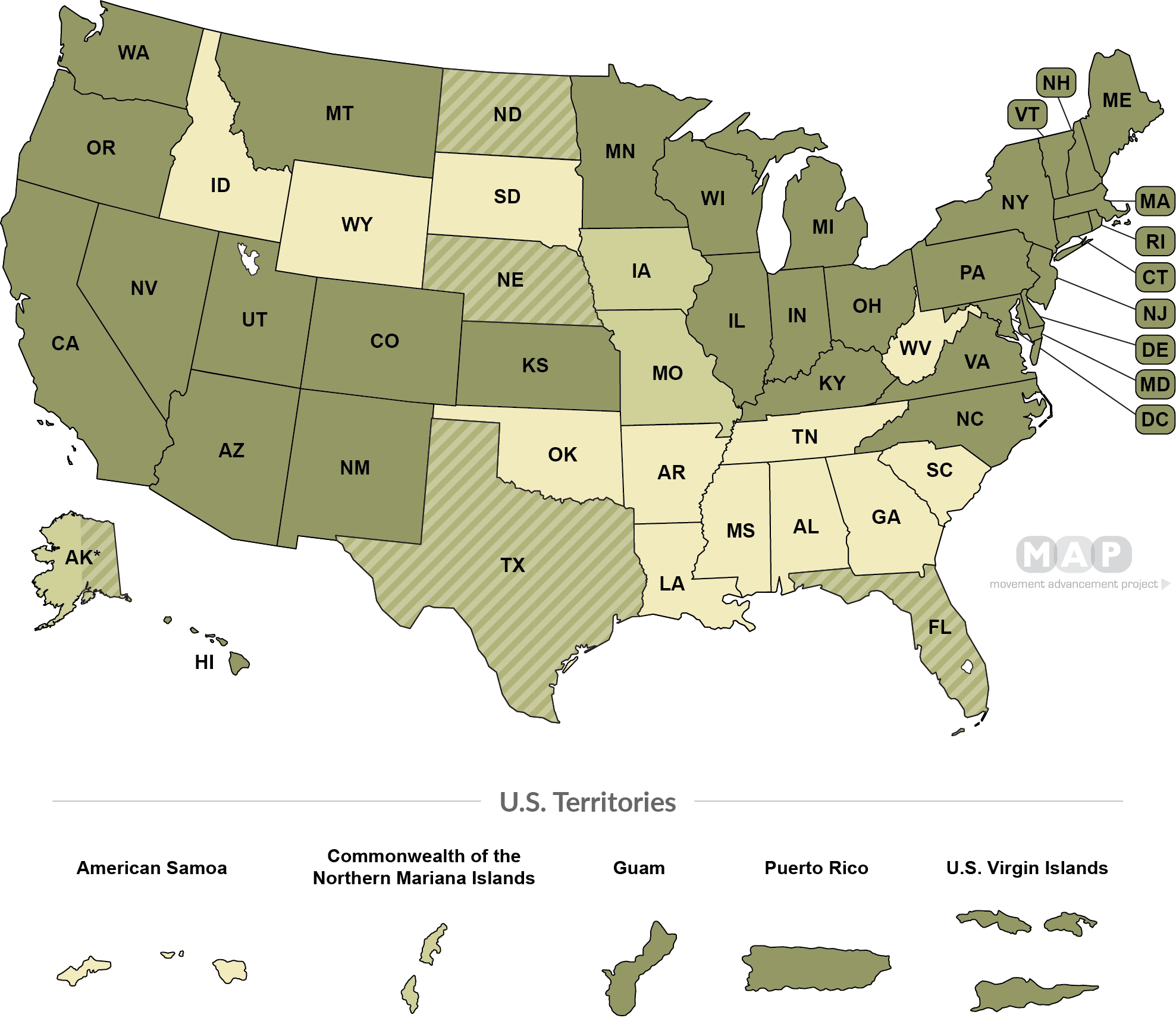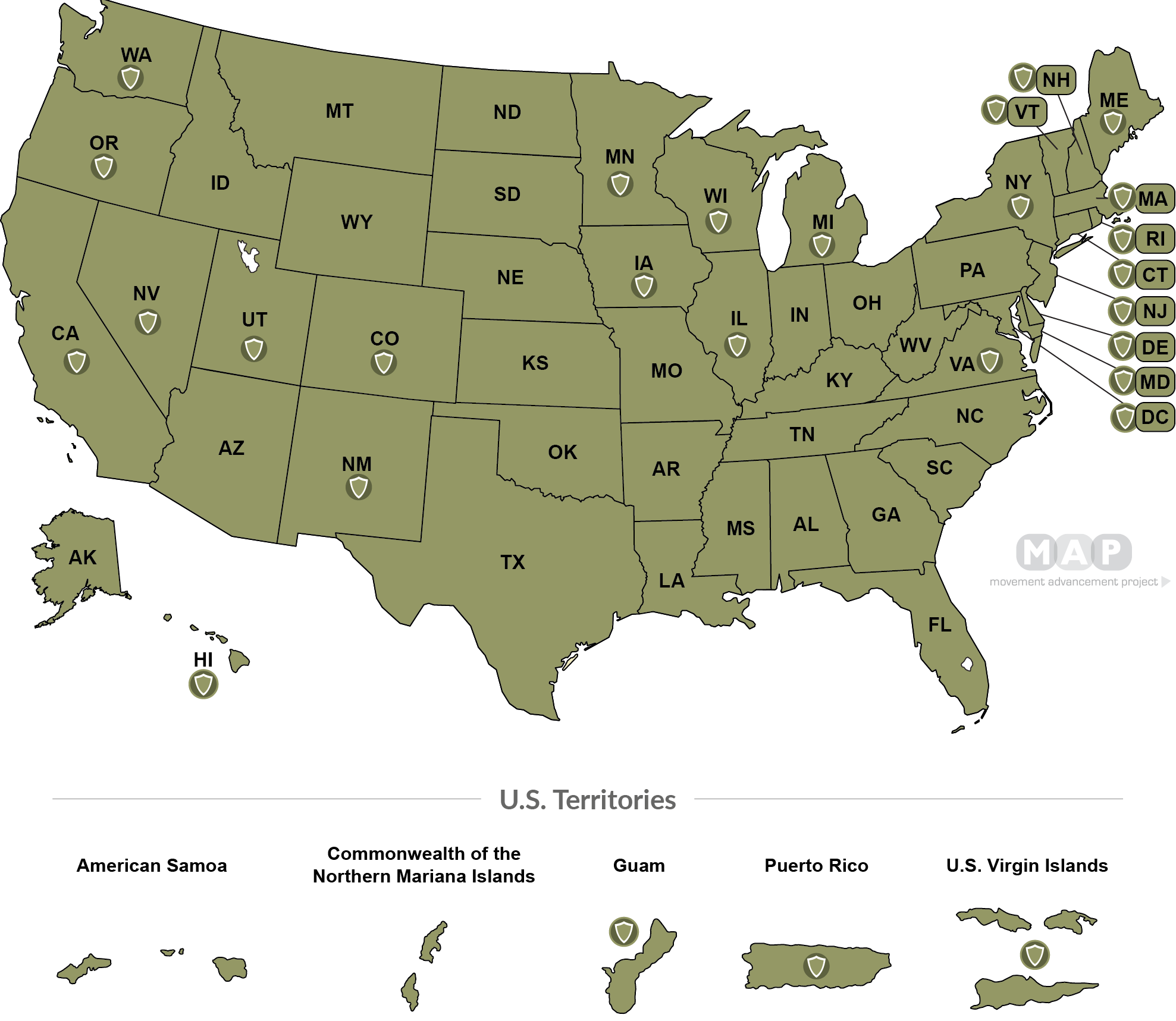A June 2020 Supreme Court ruling affirmed that LGBTQ people across the country are protected by federal law against discrimination in the workplace. A growing number of states and localities also have such protections, and these state and local laws remain important so that LGBTQ people are protected against discrimination at every level of government. These state and local laws also often include protections against discrimination beyond employment, such as in housing and public places. State employment nondiscrimination laws protect LGBTQ people from being unfairly fired, not hired, or discriminated against in the workplace by private employers on the basis of sexual orientation or gender identity. This map shows state nondiscrimination laws that explicitly enumerate sexual orientation and/or gender identity as protected classes, as well as states that explicitly interpret existing sex protections to include sexual orientation and/or gender identity.

As a result of a June 2020 U.S. Supreme Court ruling, people in all states can seek recourse for employment discrimination based sexual orientation and gender identity through the federal Equal Employment Opportunity Commission and federal courts.
State law explicitly prohibits discrimination based on sexual orientation and gender identity (22 states , 3 territories + D.C.)
State explicitly interprets existing prohibition on sex discrimination to include sexual orientation and/or gender identity (10 states)
State law explicitly prohibits discrimination based on sexual orientation only (2 states)
No explicit prohibitions for discrimination based on sexual orientation or gender identity in state law (16 states, 2 territories)
- Notes:
Nearly all states prohibit employment discrimination on the basis of sex (with the exceptions of Alabama, Georgia, and Mississippi). The Supreme Court's June 2020 decision in Bostock affirmed that sex-based discrimination includes discrimination based on sexual orientation and gender identity. However, states with sex-based protections are only included in the above map if the state government or agency has explicitly affirmed they interpret the state's ban on sex discrimination to also apply to discrimination based on sexual orientation and gender identity (as per the logic in the U.S. Supreme Court's June 2020 decision in Bostock). See the "State-by-State Statutes" document for more detail.
- Missouri's Supreme Court held in February 2019 that, under Missouri law, it is illegal for employers to discriminate based on sex stereotypes. While the ruling held that discrimination based on sexual orientation is not a form of sex stereotyping, the decision does affirm the right of LGBTQ Missourians to (like all Missourians) bring charges of employment discrimination based on sex stereotyping.
Individuals who have experienced discrimination should contact Lambda Legal's Help Desk or otherwise seek legal advice. This map is not intended as legal advice.
Recommended citation:
Movement Advancement Project. "Equality Maps: Employment Nondiscrimination Laws." https://www.lgbtmap.org/equality_maps/employment_non_discrimination_laws. Accessed 02/26/2026.
Percent of Adult LGBTQ Population Covered by Laws
*Note: These percentages reflect estimates of the LGBTQ adult population living in the 50 states and the District of Columbia. Estimates of the LGBTQ adult population in the five inhabited U.S. territories are not available, and so cannot be reflected here.
49 % of LGBTQ population lives in states prohibiting employment discrimination based on sexual orientation and gender identity
28 % of LGBTQ population lives in states explicitly interpreting existing prohibition on sex discrimination to include sexual orientation and/or gender identity
3 % of LGBTQ population lives in states prohibiting employment discrimination based on sexual orientation only
20 % of LGBTQ population lives in states that do not prohibit employment discrimination based on sexual orientation or gender identity (including 2% of LGBTQ population living in states that preempt local nondiscrimination laws)
A June 2020 Supreme Court ruling affirmed that LGBTQ people across the country are protected by federal law against discrimination in the workplace. A growing number of states and localities also have such protections, and these state and laws remain important so that LGBTQ people are protected against discrimination at every level of government. These state and local laws also often include protections against discrimination beyond employment, such as in housing and public places. See here for additional tracking of local ordinances in those areas.
This map shows state laws and local ordinances prohibiting employment discrimination based on sexual orientation and/or gender identity. Specifically, the map shows the percent of each state’s population that is protected by local ordinances against employment discrimination based on both sexual orientation and gender identity. For more information about a state's local-level coverage, including whether there are fewer protections for gender identity than sexual orientation, please see the the detailed information in each state’s profile by clicking on that state in the map below.

As a result of a June 2020 U.S. Supreme Court ruling, people in all states can seek recourse for employment discrimination based on sexual orientation and gender identity through the federal Equal Employment Opportunity Commission and federal courts.
-

Percent of the state population protected by state laws or local nondiscrimination ordinances from discrimination based on both sexual orientation and gender identity

Percent of the state population protected by local ordinances from discrimination based on both sexual orientation and gender identity
State has law prohibiting discrimination based on sexual orientation, but not gender identity
State has law preventing passage or enforcement of local nondiscrimination ordinances
Note that enforcement mechanisms within these ordinances varies by jurisdiction. Note also that some jurisdictions may prohibit discrimination in public employment (i.e., government employees only), but only ordinances that prohibit discrimination in private employment are included here.
Recommended citation:
Movement Advancement Project. "Equality Maps: Employment Nondiscrimination Laws." https://www.lgbtmap.org/equality_maps/employment_non_discrimination_laws.
Accessed 02/26/2026.
Percent of Adult LGBTQ Population Covered by Laws
*Note: These percentages reflect estimates of the LGBTQ adult population living in the 50 states and the District of Columbia. Estimates of the LGBTQ adult population in the five inhabited U.S. territories are not available, and so cannot be reflected here.
Click here for a list of city and county ordinances by state.
This map shows state laws or policies that prohibit discrimination against state employees on the basis of sexual orientation and/or gender identity. As a result of a 2020 U.S. Supreme Court ruling, state employees can seek recourse for employment discrimination based sexual orientation and gender identity through the federal Equal Employment Opportunity Commission and
federal courts.

As a result of a June 2020 U.S. Supreme Court ruling, people in all states can seek recourse for employment discrimination based on sexual orientation and gender identity through the federal Equal Employment Opportunity Commission and federal courts.
State public employment nondiscrimination policy covers sexual orientation and gender identity (31 states , 3 territories + D.C.)
State explicitly interprets existing prohibition on sex discrimination to include sexual orientation and/or gender identity (5 states)
State public employment nondiscrimination policy covers sexual orientation only (3 states, 1 territory)
No state policy prohibiting discrimination against public employees based on sexual orientation or gender identity (16 states, 1 territory)
*Note: Alaska prohibits discrimination against state employees based on sexual orientation via executive order, and based on gender identity via interpretation of existing state law prohibiting discrimination based on sex. Click the "Read the State-by-State Statutes" button below the map for more detail.
Recommended citation:
Movement Advancement Project. "Equality Maps: Employment Nondiscrimination Laws."https://www.lgbtmap.org/equality-maps/non_discrimination_laws. Accessed 02/26/2026.
Percent of Adult LGBTQ Population Covered by Laws
*Note: These percentages reflect estimates of the LGBTQ adult population living in the 50 states and the District of Columbia. Estimates of the LGBTQ adult population in the five inhabited U.S. territories are not available, and so cannot be reflected here.
69 % of the LGBTQ population lives in states with policies that protect state employees from discrimination based on sexual orientation and gender identity
15 % of the LGBTQ population lives in states that explicitly interpret existing prohibition on sex discrimination to include sexual orientation and/or gender identity
3 % of the LGBTQ population lives in states with policies that protect state employees from discrimination based on sexual orientation only
13 % of the LGBTQ population lives in states with no state policy prohibiting discrimination in public employment based on sexual orientation or gender identity








